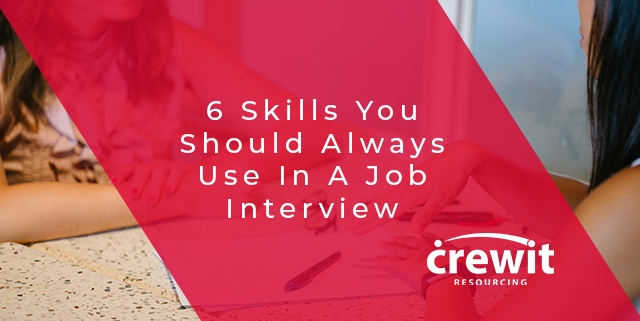6 Skills You Should Always Use At A Job Interview
Applying for a new job? Taking that next step in your career? Your interpersonal skills are usually just as important as your technical abilities.
Showing off a higher emotional intelligence can assure employers that you can fit into any working environment and enable you to stand out from the other candidates more effectively than the contents of your CV.
Here is a summary of 6 of the most useful interpersonal skills you need to use whenever you attend a job interview:
1. Always Be Positive
An upbeat attitude is infectious and will make you a pleasure to be around. A dynamic office environment depends on positive morale. Showing you can naturally bring this mindset to work every morning could make the crucial difference between you and an equally matched but sullen candidate.
2. Be Receptive
Being open to feedback and a willingness to listen can help you develop both personally and professionally. But to take feedback on board, you must first listen to it and then respond sensibly and enthusiastically. You don’t even need to think about your response; just listening to what is being said and maintaining a positive body language would be enough for most consultants and managers to positively judge your character.
3. Display Self Confidence
Showing self-confidence to an employer will immediately improve the way they perceive you and your ability to complete the job a client has set out. Your ideas and opinions will be taken more seriously and will add or ratify credence to your skills shown on your CV. It also establishes that you should be able to deal with challenging situations quickly and effectively. But always remember that you should never confuse self-confidence with arrogance!
4. Show Flexibility
The world of work is evolving at a faster rate than ever, and employers are actively looking for people who can show initiative and a willingness to adapt. Everyone loves a candidate who is keen to work with the team/company and learn new techniques and technologies etc.
5. Relationship Management
Building effective business relationships is one thing but managing them is something entirely different. Whether you are at a junior or management level at every company you will be expected to manage interpersonal relationships with colleagues and clients alike to some extent or another. From you first interview and throughout your career this is an important skill.
6. Body Language
Remember when we connect with a person, we also have to make it clear to each other how the content of a spoken message needs to be interpreted. but sometimes we are unable to deliver our messages by spoken or even written languages so we use the body language to supplement what we want to say by gesturing, moving or even giving some facial expressions. At an interview people will not just be listening to what you say but also observing how you act. Before attending an interview pay extra attention to posture, eye contact, smiles and any ‘annoying’ habits that you have (i.e. playing with your pen or hair etc).
Good luck!



